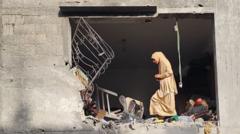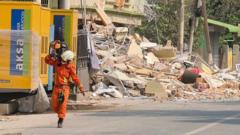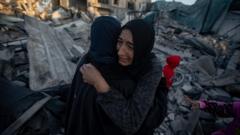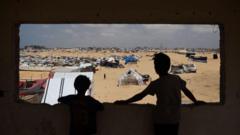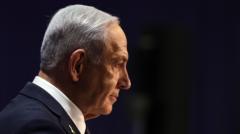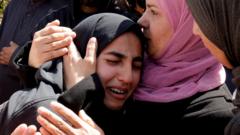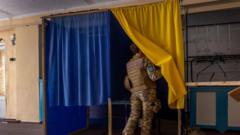An Israeli airstrike in the southern suburbs of Beirut has resulted in at least three fatalities, escalating tensions amid a delicate ceasefire.
Israeli Airstrike Claims Three Lives in Beirut: Tensions Escalate
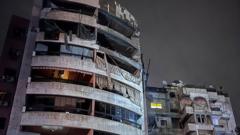
Israeli Airstrike Claims Three Lives in Beirut: Tensions Escalate
Recent Israeli military action raises concerns for fragile peace in Lebanon.
The article:
An Israeli airstrike targeting the southern suburbs of Beirut led to the deaths of at least three individuals, according to the Lebanese health ministry. This incident adds pressure on an already fragile ceasefire between Israel and Hezbollah, the Lebanese paramilitary group. The airstrike occurred in the Dahieh area, known for its strong Hezbollah presence, and marks Israel's second strike in the area within recent days despite a truce that was established in November.
The Israeli military stated they were targeting a Hezbollah operative who allegedly assisted Hamas in planning an attack on Israeli civilians. So far, Hezbollah has not released any official response. Lebanon's President Joseph Aoun condemned the airstrike, describing it as a dangerous provocation, while Prime Minister Nawaf Salam called it a "flagrant violation" of the ceasefire agreement.
The strike took place in the early hours, catching residents off guard, and images from the site revealed significant damage to the top floors of a nearby apartment building. The Israel Defence Forces (IDF) and the Israel Security Agency (ISA) confirmed that the strike was a necessary action to eliminate an imminent threat posed by the targeted individual.
This recent action follows prior strikes by Israel aimed at dismantling Hezbollah's military capabilities, which Israel argues are essential for the security of its citizens. In a recent attack, Israel targeted a drone storage facility linked to Hezbollah after two rockets were reportedly fired from Southern Lebanon into northern Israel. Hezbollah, however, denied its involvement in that rocket launch and insisted on its commitment to upholding the ceasefire.
Since the commencement of hostilities, Israel has maintained a policy of conducting regular airstrikes against targets associated with Hezbollah, asserting its goal is to prevent the group from rearming. The Lebanese government decries these assaults, along with Israeli military presence in several southern locations, viewing them as violations of the peace truce.
The current conflict originated when Hezbollah initiated military operations in solidarity with Palestinians following the Hamas attacks on October 7, 2023. This escalation of violence has resulted in approximately 4,000 casualties in Lebanon, predominantly civilians, as well as displacing over 1.2 million people. Israel's overarching objective in confronting Hezbollah has been to facilitate the return of displaced residents from northern communities while curbing the militia’s influence along the border regions.
An Israeli airstrike targeting the southern suburbs of Beirut led to the deaths of at least three individuals, according to the Lebanese health ministry. This incident adds pressure on an already fragile ceasefire between Israel and Hezbollah, the Lebanese paramilitary group. The airstrike occurred in the Dahieh area, known for its strong Hezbollah presence, and marks Israel's second strike in the area within recent days despite a truce that was established in November.
The Israeli military stated they were targeting a Hezbollah operative who allegedly assisted Hamas in planning an attack on Israeli civilians. So far, Hezbollah has not released any official response. Lebanon's President Joseph Aoun condemned the airstrike, describing it as a dangerous provocation, while Prime Minister Nawaf Salam called it a "flagrant violation" of the ceasefire agreement.
The strike took place in the early hours, catching residents off guard, and images from the site revealed significant damage to the top floors of a nearby apartment building. The Israel Defence Forces (IDF) and the Israel Security Agency (ISA) confirmed that the strike was a necessary action to eliminate an imminent threat posed by the targeted individual.
This recent action follows prior strikes by Israel aimed at dismantling Hezbollah's military capabilities, which Israel argues are essential for the security of its citizens. In a recent attack, Israel targeted a drone storage facility linked to Hezbollah after two rockets were reportedly fired from Southern Lebanon into northern Israel. Hezbollah, however, denied its involvement in that rocket launch and insisted on its commitment to upholding the ceasefire.
Since the commencement of hostilities, Israel has maintained a policy of conducting regular airstrikes against targets associated with Hezbollah, asserting its goal is to prevent the group from rearming. The Lebanese government decries these assaults, along with Israeli military presence in several southern locations, viewing them as violations of the peace truce.
The current conflict originated when Hezbollah initiated military operations in solidarity with Palestinians following the Hamas attacks on October 7, 2023. This escalation of violence has resulted in approximately 4,000 casualties in Lebanon, predominantly civilians, as well as displacing over 1.2 million people. Israel's overarching objective in confronting Hezbollah has been to facilitate the return of displaced residents from northern communities while curbing the militia’s influence along the border regions.

